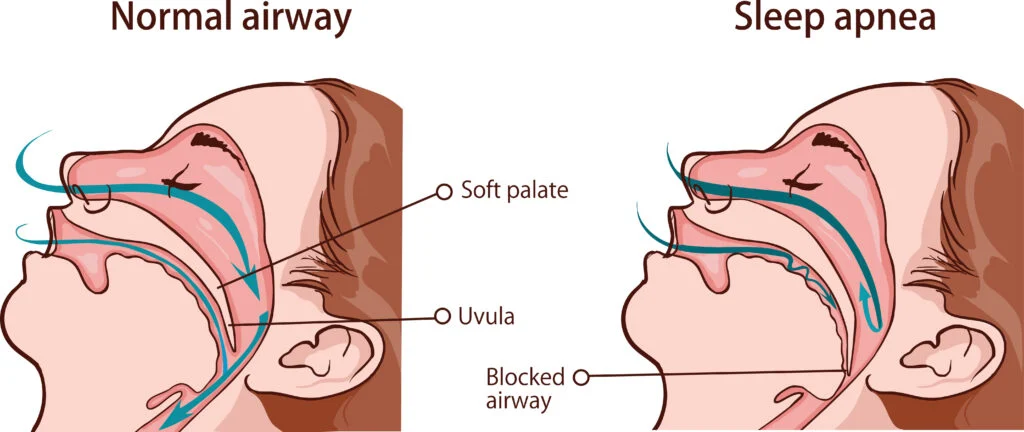
Mouth Breathing Shrinks Your Brain’s Oxygen Supply
How you breathe directly affects how much oxygen your brain receives — and how well it can function. While both the mouth and nose can bring air into your body, only nasal breathing delivers oxygen in the most efficient, brain-friendly way.
When you breathe through your nose, the air is filtered, warmed, humidified, and mixed with nitric oxide before it reaches your lungs. This process improves oxygen uptake into the bloodstream and ensures that oxygen is efficiently transported to the brain. Mouth breathing bypasses these steps, leading to a measurable drop in oxygen delivery. Over time, this can affect memory, focus, problem-solving ability, and emotional regulation.
Nasal breathing increases oxygen intake by roughly 18% compared to mouth breathing (Jones et al. 2021). That extra oxygen supports mental stability and sharpness. Mouth breathing limits this supply, and the reduction can leave your brain running in an energy deficit — much like trying to power a high-performance engine with low-grade fuel.
Why Nasal Breathing Matters for Brain Function
Your nose is far more than a passive air channel. It is part of a complex system designed to optimize oxygen absorption. Inside the nasal passages, tiny blood vessels warm and moisten incoming air while specialized cells release nitric oxide, a molecule that expands blood vessels and improves circulation to the brain.
Skipping this pathway has consequences. When you breathe through your mouth, you miss out on nitric oxide production and the enhanced oxygen transfer that comes with it. This leaves less oxygen available for your brain’s high-energy demands.

What Happens When You Rely on Mouth Breathing
Reduced Oxygen Uptake
Without the nasal pathway, oxygen absorption per breath decreases. Even mild drops in oxygen can lead to fatigue and mental fog.
Cognitive Slowdown
Lower oxygen delivery impairs the brain’s processing speed, memory recall, and ability to solve problems. Chronic mouth breathing has been linked to reduced cognitive performance (Abreu et al. 2019).
Lower Stress Resilience
Adequate oxygen supports the parasympathetic nervous system — the part of your brain and body that keeps stress in check. Reduced oxygen lowers your threshold for handling pressure, making it easier for anxiety or overwhelm to set in.
The Neurological Link Between Breathing and Brain Performance
Breathing patterns influence neural activity through the vagus nerve and respiratory centers in the brainstem. Nasal breathing stimulates slow-wave brain activity in the hippocampus, the memory center of the brain, and helps regulate the amygdala, which processes emotional responses (Zelano et al. 2016).
Mouth breathing bypasses these pathways, reducing the synchrony between breathing rhythms and neural oscillations that support attention and working memory.
How to Switch from Mouth Breathing to Nasal Breathing
- Check Your Breathing
Several times a day, notice whether your mouth is open. Gently close it and draw air in through your nose. - Clear Nasal Passages
If congestion makes nasal breathing difficult, use saline rinses, steam inhalation, or allergy treatment to open the airway. - Train Your Breath
Practice light, slow nasal breathing during walking, gentle exercise, or meditation. Over time, your body will default to this pattern even during rest and sleep. - Monitor Nighttime Breathing
If you wake with a dry mouth, you may be mouth breathing in your sleep. Nasal strips or posture adjustments can help encourage nasal breathing overnight.
The Takeaway
Mouth breathing is more than just a bad habit — it is a subtle but significant drain on your brain’s oxygen supply. By making the switch to nasal breathing, you improve oxygen delivery, sharpen cognitive performance, and boost your resilience to stress. Small changes in how you breathe can translate into big gains in mental clarity and emotional stability.
References
- Abreu RR et al. (2019) ‘Mouth breathing and its consequences in childhood and adolescence: a systematic literature review’, Brazilian Journal of Otorhinolaryngology, 85(5): 575–584. https://doi.org/10.1016/j.bjorl.2018.06.001
- Jones R, Smith T, Wilson A (2021) ‘Impact of breathing route on oxygen saturation and exercise performance’, Respiratory Physiology & Neurobiology, 285:103606. https://doi.org/10.1016/j.resp.2021.103606
- Zelano C et al. (2016) ‘Nasal respiration entrains human limbic oscillations and modulates cognitive function’, Journal of Neuroscience, 36(49):12448–12467. https://doi.org/10.1523/JNEUROSCI.2586-16.2016



















